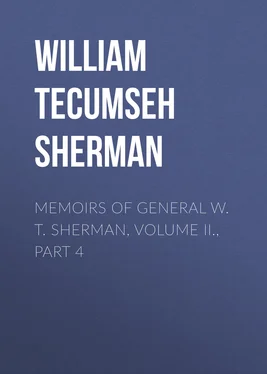William Tecumseh Sherman - Memoirs of General W. T. Sherman, Volume II., Part 4
Здесь есть возможность читать онлайн «William Tecumseh Sherman - Memoirs of General W. T. Sherman, Volume II., Part 4» — ознакомительный отрывок электронной книги совершенно бесплатно, а после прочтения отрывка купить полную версию. В некоторых случаях можно слушать аудио, скачать через торрент в формате fb2 и присутствует краткое содержание. Жанр: Биографии и Мемуары, История, foreign_edu, foreign_antique, foreign_prose, на английском языке. Описание произведения, (предисловие) а так же отзывы посетителей доступны на портале библиотеки ЛибКат.
- Название:Memoirs of General W. T. Sherman, Volume II., Part 4
- Автор:
- Жанр:
- Год:неизвестен
- ISBN:нет данных
- Рейтинг книги:5 / 5. Голосов: 1
-
Избранное:Добавить в избранное
- Отзывы:
-
Ваша оценка:
- 100
- 1
- 2
- 3
- 4
- 5
Memoirs of General W. T. Sherman, Volume II., Part 4: краткое содержание, описание и аннотация
Предлагаем к чтению аннотацию, описание, краткое содержание или предисловие (зависит от того, что написал сам автор книги «Memoirs of General W. T. Sherman, Volume II., Part 4»). Если вы не нашли необходимую информацию о книге — напишите в комментариях, мы постараемся отыскать её.
Memoirs of General W. T. Sherman, Volume II., Part 4 — читать онлайн ознакомительный отрывок
Ниже представлен текст книги, разбитый по страницам. Система сохранения места последней прочитанной страницы, позволяет с удобством читать онлайн бесплатно книгу «Memoirs of General W. T. Sherman, Volume II., Part 4», без необходимости каждый раз заново искать на чём Вы остановились. Поставьте закладку, и сможете в любой момент перейти на страницу, на которой закончили чтение.
Интервал:
Закладка:
7. Negroes who are able-bodied and can be of service to the several columns may be taken along; but each army commander will bear in mind that the question of supplies is a very important one, and that his first duty is to see to those who bear arms.
8. The organization, at once, of a good pioneer battalion for each army corps, composed if possible of negroes, should be attended to. This battalion should follow the advance-guard, repair roads and double them if possible, so that the columns will not be delayed after reaching bad places. Also, army commanders should practise the habit of giving the artillery and wagons the road, marching their troops on one side, and instruct their troops to assist wagons at steep hills or bad crossings of streams.
9. Captain O. M. Poe, chief-engineer, will assign to each wing of the army a pontoon-train, fully equipped and organized; and the commanders thereof will see to their being properly protected at all times.
By order of Major-General W. T. Sherman,
L. M. DAYTON, Aide-de-Camp.
The greatest possible attention had been given to the artillery and wagon trains. The number of guns had been reduced to sixty-five, or about one gun to each thousand men, and these were generally in batteries of four guns each.
Each gun, caisson, and forges was drawn by four teams of horses. We had in all about twenty-five hundred wagons, with teams of six mules to each, and six hundred ambulances, with two horses to each. The loads were made comparatively light, about twenty-five hundred pounds net; each wagon carrying in addition the forage needed by its own team: Each soldier carried on his person forty rounds of ammunition, and in the wagons were enough cartridges to make up about two hundred rounds per man, and in like manner two hundred rounds of assorted ammunition were carried for each gun.
The wagon-trains were divided equally between the four corps, so that each had about eight hundred wagons, and these usually on the march occupied five miles or more of road. Each corps commander managed his own train; and habitually the artillery and wagons had the road, while the men, with the exception of the advance and rear guards, pursued paths improvised by the aide of the wagons, unless they were forced to use a bridge or causeway in common.
I reached Atlanta during the afternoon of the 14th, and found that all preparations had been made-Colonel Beckwith, chief commissary, reporting one million two hundred thousand rations in possession of the troops, which was about twenty days' supply, and he had on hand a good supply of beef-cattle to be driven along on the hoof. Of forage, the supply was limited, being of oats and corn enough for five days, but I knew that within that time we would reach a country well stocked with corn, which had been gathered and stored in cribs, seemingly for our use, by Governor Brown's militia.
Colonel Poe, United States Engineers, of my staff, had been busy in his special task of destruction. He had a large force at work, had leveled the great depot, round house, and the machine-shops of the Georgia Railroad, and had applied fire to the wreck. One of these machine-shops had been used by the rebels as an arsenal, and in it were stored piles of shot and shell, some of which proved to be loaded, and that night was made hideous by the bursting of shells, whose fragments came uncomfortably, near Judge Lyon's house, in which I was quartered. The fire also reached the block of stores near the depot, and the heart of the city was in flames all night, but the fire did not reach the parts of Atlanta where the court-house was, or the great mass of dwelling houses.
The march from Atlanta began on the morning of November 15th, the right wing and cavalry following the railroad southeast toward Jonesboro', and General Slocum with the Twentieth Corps leading off to the east by Decatur and Stone Mountain, toward Madison. These were divergent lines, designed to threaten both Mason and Augusta at the same time, so as to prevent a concentration at our intended destination, or "objective," Milledgeville, the capital of Georgia, distant southeast about one hundred miles. The time allowed each column for reaching Milledgeville was seven days. I remained in Atlanta during the 15th with the Fourteenth Corps, and the rear-guard of the right wing, to complete the loading of the trains, and the destruction of the buildings of Atlanta which could be converted to hostile uses, and on the morning of the 16th started with my personal staff, a company of Alabama cavalry, commanded by Lieutenant Snelling, and an infantry company, commanded by Lieutenant McCrory, which guarded our small train of wagons.
My staff was then composed of Major L. M. Dayton, aide-de-camp and acting adjutant-general, Major J. C. McCoy, and Major J. C. Audenried, aides. Major Ward Nichols had joined some weeks before at Gaylesville, Alabama, and was attached as an acting aide-de-camp. Also Major Henry Hitchcock had joined at the same time as judge-advocate. Colonel Charles Ewing was inspector-general, and Surgeon John Moore medical director. These constituted our mess. We had no tents, only the flies, with which we nightly made bivouacs with the assistance of the abundant pine-boughs, which made excellent shelter, as well as beds.
Colonel L. C. Easton was chief-quartermaster; Colonel Amos Beckwith, chief-commissary; Colonel O. M. Poe, chief-engineer; and Colonel T. G. Baylor, chief of ordnance. These invariably rode with us during the day, but they had a separate camp and mess at night.
General William F. Barry had been chief of artillery in the previous campaign, but at Kingston his face was so swollen with erysipelas that he was reluctantly compelled to leave us for the rear; and he could not, on recovering, rejoin us till we had reached Savannah.
About 7 a.m. of November 16th we rode out of Atlanta by the Decatur road, filled by the marching troops and wagons of the Fourteenth Corps; and reaching the hill, just outside of the old rebel works, we naturally paused to look back upon the scenes of our past battles. We stood upon the very ground whereon was fought the bloody battle of July 22d, and could see the copse of wood where McPherson fell. Behind us lay Atlanta, smouldering and in ruins, the black smoke rising high in air, and hanging like a pall over the ruined city. Away off in the distance, on the McDonough road, was the rear of Howard's column, the gun-barrels glistening in the sun, the white-topped wagons stretching away to the south; and right before us the Fourteenth Corps, marching steadily and rapidly, with a cheery look and swinging pace, that made light of the thousand miles that lay between us and Richmond. Some band, by accident, struck up the anthem of "John Brown's soul goes marching on;" the men caught up the strain, and never before or since have I heard the chorus of "Glory, glory, hallelujah!" done with more spirit, or in better harmony of time and place.
Then we turned our horses' heads to the east; Atlanta was soon lost behind the screen of trees, and became a thing of the past. Around it clings many a thought of desperate battle, of hope and fear, that now seem like the memory of a dream; and I have never seen the place since. The day was extremely beautiful, clear sunlight, with bracing air, and an unusual feeling of exhilaration seemed to pervade all minds–a feeling of something to come, vague and undefined, still full of venture and intense interest. Even the common soldiers caught the inspiration, and many a group called out to me as I worked my way past them, "Uncle Billy, I guess Grant is waiting for us at Richmond!" Indeed, the general sentiment was that we were marching for Richmond, and that there we should end the war, but how and when they seemed to care not; nor did they measure the distance, or count the cost in life, or bother their brains about the great rivers to be crossed, and the food required for man and beast, that had to be gathered by the way. There was a "devil-may-care" feeling pervading officers and men, that made me feel the full load of responsibility, for success would be accepted as a matter of course, whereas, should we fail, this "march" would be adjudged the wild adventure of a crazy fool. I had no purpose to march direct for Richmond by way of Augusta and Charlotte, but always designed to reach the sea-coast first at Savannah or Port Royal, South Carolina, and even kept in mind the alternative of Pensacola.
Читать дальшеИнтервал:
Закладка:
Похожие книги на «Memoirs of General W. T. Sherman, Volume II., Part 4»
Представляем Вашему вниманию похожие книги на «Memoirs of General W. T. Sherman, Volume II., Part 4» списком для выбора. Мы отобрали схожую по названию и смыслу литературу в надежде предоставить читателям больше вариантов отыскать новые, интересные, ещё непрочитанные произведения.
Обсуждение, отзывы о книге «Memoirs of General W. T. Sherman, Volume II., Part 4» и просто собственные мнения читателей. Оставьте ваши комментарии, напишите, что Вы думаете о произведении, его смысле или главных героях. Укажите что конкретно понравилось, а что нет, и почему Вы так считаете.












